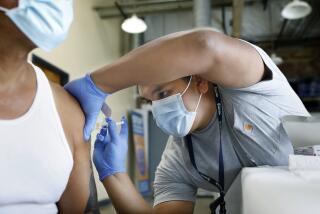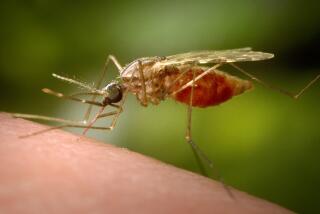First Immune Response Seen in Trials With AIDS Vaccine
- Share via
Seven of the first U.S. volunteers inoculated with an experimental AIDS vaccine appear to have developed an immune response to the injections, federal researchers reported Saturday in Washington.
Scientists for the National Institute of Allergy and Infectious Diseases said they were encouraged by the new data, which was obtained last week. It is the first evidence of an immune response to the test vaccine to be gathered during the seven-month study.
But researchers cautioned that the search for a vaccine is still in its earliest stages.
“The bottom line is that this is very preliminary data,” Dr. Joseph A. Kovacs, a senior National Institutes of Health investigator and one of the vaccine researchers, said in a telephone interview. “It doesn’t say anything about whether the vaccine is going to be useful or not.”
Because it took longer to trigger an immune response than was expected, the researchers are going ahead with plans to extend the 59-person study by recruiting 15 additional volunteers and doubling the maximum dose of vaccine to be tested, Kovacs said. The Times last Tuesday reported on plans to expand the testing.
The NIAID accomplishments to date are much less comprehensive than those of Dr. Daniel Zagury, the French AIDS researcher who announced last month that he had significantly boosted his immunity against the AIDS virus through repeated self-injections of a different prototype vaccine.
An immune response means that an individual’s immune system produces protective molecules called antibodies, which fight infections. While the current results show that the test vaccines trigger the production of antibodies, they do not prove that these antibodies protect against the AIDS virus. Neither the American volunteers nor Zagury has ever been exposed to the lethal virus.
These first trials are intended only to test the safety of vaccines and potential doses, not their effectiveness against the AIDS virus.
The new findings in the U.S. tests were reported at the annual meeting of the American Federation for Clinical Research. They show that six of 15 volunteers immunized with 40 micrograms of the test vaccine now have an immune response. Four of the six who tested positive had received a booster injection; the other two had not.
The response was detected through blood tests conducted eight weeks after the volunteers received their first immunization, the results of which were received by Kovacs and his co-investigators Wednesday. The blood test, called the Western Blot, can identify specific proteins from the AIDS virus against which an individual’s immune system is reacting.
In addition, one of 15 volunteers immunized with 80 micrograms of the test vaccine had a detectable antibody response after three weeks, Kovacs said. This dose of the trial vaccine has been shown to induce a strong immune response when tested in chimpanzees.
By comparison, none of the 29 volunteers who received either 10 or 20 microgram test doses have developed laboratory evidence of an immune response after more than eight weeks of follow-up.
Frequent additional blood tests are planned for all the volunteers over the next several months.
“We are now in a dose range where we are seeing an antibody response to the protein (the volunteers) are being immunized with,” Kovacs said. “That is really a major purpose of the study.”
The test vaccine “appears to be safe,” Kovacs added. Some volunteers developed tenderness and swelling at their injection sites and brief flu-like symptoms, but no serious side-effects of the prototype vaccine were seen.
The federal tests are being conducted with a vaccine manufactured by MicroGeneSys Inc., a biopharmaceutical firm in West Haven, Conn. The test vaccine is based on a purified envelope protein, called gp160, from the human immunodeficiency virus (HIV), which is the cause of AIDS. The protein is mass-produced through genetic engineering techniques by combining the gene coding for the protein with an insect virus.
In the next several months, federal researchers plan to expand their tests by recruiting 15 additional volunteers to test a 160-microgram dose of the vaccine, which is double the maximum dose they had originally planned to test.
Two other research groups are conducting human trials of potential AIDS vaccines. Zagury and vaccine researchers at the University of Washington School of Medicine in Seattle are separately testing live-virus AIDS vaccines made with recombinant DNA technology.
In this approach, the gene for the gp160 protein is inserted into the vaccinia, or cowpox virus, a usually harmless virus that was employed in the past to immunize humans against smallpox.
Two weeks ago, Zagury, a professor of immunology at the Pierre and Marie Curie University in Paris, reported in the British journal Nature that he had shown “for the first time that an immune state against the (AIDS) virus can be obtained in man.”
The report covered a series of dramatic self-experiments that Zagury began in November, 1986. It presented laboratory evidence of a strong immune response against divergent strains of the AIDS virus, which had persisted for more than a year.
“We have a better result in him than we have so far seen in any animal,” Dr. Robert C. Gallo of the National Cancer Institute said in a recent interview. Gallo, a co-discoverer of the AIDS virus, was a co-author along with 15 other scientists on Zagury’s report.
The University of Washington researchers are using a test vaccine made by Oncogen, a Seattle-based subsidiary of the Bristol-Myers Co. The researchers have yet to make public their preliminary results.






